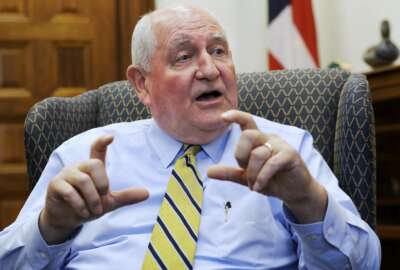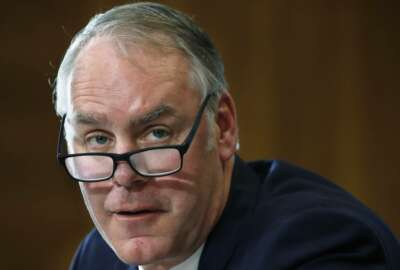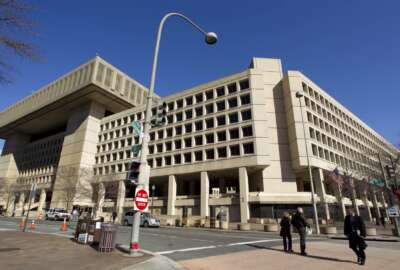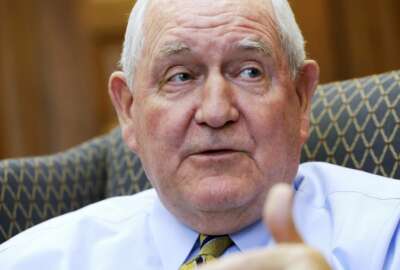

Agriculture Secretary Sonny Perdue said by the end of 2019 employees working for the Economic Research Service (ERS) and the National Institute of Food and...
Best listening experience is on Chrome, Firefox or Safari. Subscribe to Federal Drive’s daily audio interviews on Apple Podcasts or PodcastOne.
The Agriculture Department continues its aggressive reorganization efforts with Secretary Sonny Perdue announcing plans Thursday to move two sub-agencies out of the Washington, D.C. metro area.
Perdue said by the end of 2019 employees working for the Economic Research Service (ERS), currently under USDA’s Research, Education, and Economics mission area, and the National Institute of Food and Agriculture (NIFA) will be relocated outside the D.C. area. The two bureaus include about 700 employees, but how many would have to move from the D.C. area is unclear.
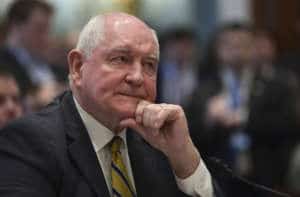
“In our administration, we have looked critically at the way we do business, with the ultimate goal of ensuring the best service possible for our customers, and for the taxpayers of the United States,” Perdue said in a release. “In some cases, this has meant realigning some of our offices and functions, or even relocating them, in order to make more logical sense or provide more streamlined and efficient services.”
Additionally, Perdue said he is realigning the Office of the Chief Economist (OCE) to fall under the Office of the Secretary.
Perdue has been one of the most assertive cabinet members in reshaping his agency. Behind his OneUSDA initiative, Perdue has been taking steps to promote more efficiencies and ensure the effectiveness of the agency. He consolidated the number of agency chief information officers, reduced the number of administrative functions and created more logical reporting structures.
At the same time, Perdue also was among the first agency chiefs to cut back on the number of days employees could telework, and proposed a 9 percent cut in the size of the agency’s workforce and a $6 billion decrease in funding for fiscal 2019.
Previously, the idea to relocate employees and offices away from D.C. had been mostly talk. Interior Department Secretary Ryan Zinke discussed the option of relocating employees and offices out west to serve smaller communities. Additionally, the concept of relocation is becoming a hot topic for some members of Congress in recent months. The Strategic Withdrawal of Agencies for Meaningful Placement (SWAMP) Act, which Rep. Luke Messer (R-Ind.) introduced, would authorize agencies to move their headquarters out of the Washington, D.C. area.
Emails seeking comment from some of the unions representing USDA employees, including the American Federation of Government Employees, the National Treasury Employees Union and the National Federation of Federal Employees, were not immediately returned.
But the decision to move parts of the agency outside of the Washington, D.C. area is among the biggest changes proposed to date.
USDA says the new location for these offices hasn’t been determined and ERS and NIFA could be co-located.
USDA says there are three main reasons for moving these two offices outside of D.C.:
ERS includes about 330 social scientists and support staff and has an annual budget of about $85 million.
NIFA, which Congress created in the 2008 Farm Bill, includes about 350 employees and an annual budget of more than $1.5 billion in 2017.
Perdue said no employees from either agency will be involuntarily separated.
“Every employee who wants to continue working will have an opportunity to do so, although that will mean moving to a new location for most. Employees will be offered relocation assistance and will receive the same base pay as before, and the locality pay for the new location,” USDA states. “For those who are interested, USDA is seeking approval from the Office of Personnel Management and the Office of Management and Budget for both Voluntary Early Retirement Authority and Voluntary Separation Incentive Payments.”
USDA also released a request for information Thursday seeking market research related to Site Selection Consultants to assist with critical relocation decisions.
“Specifically the USDA requests information from commercial firms with corporate site selection experience as well as the transfer of corporate operations to new sites,” the RFI states.
USDA wants feedback across seven areas, including experience assessing responses from state and local governments, a typical timeline from receipt of proposals to site selection and major issues that can be expected to be encountered and any federal contract vehicles that could be used for these services.
Responses are due Aug. 16.
Under President Donald Trump’s reorganization executive order, agencies and the White House developed implementation plans with 34 ideas, including the idea of moving agencies outside of the Washington, D.C. area. Of those ideas, several impacted USDA directly, including moving housing programs to the Department of Housing and Urban Development, creating a single agency to handle food safety oversight and relocating all non-commodity nutrition assistance programs to the Department of Health and Human Services.
“Due to mission and cost considerations, agencies are considering opportunities to reposition their real property footprints, including relocating staff and offices to locations outside of the National Capital Region. Unlike the private sector, which has considerable flexibility and often takes a holistic approach to real estate and corporate mission requirements, agencies do not do a good job thinking holistically about their mission, physical location and how they could deliver services differently,” the governmentwide strategy states. “The administration believes there are many lessons that can be drawn from the private sector on how to assess changing organizational requirements and how real estate footprints can be adjusted given information technology and management practices. The goal of this effort, led by GSA, is to provide agencies with thought-process, tools, and data to drive smarter decisions in agency relocations, and work is already underway.”
Copyright © 2024 Federal News Network. All rights reserved. This website is not intended for users located within the European Economic Area.
Jason Miller is executive editor of Federal News Network and directs news coverage on the people, policy and programs of the federal government.
Follow @jmillerWFED

